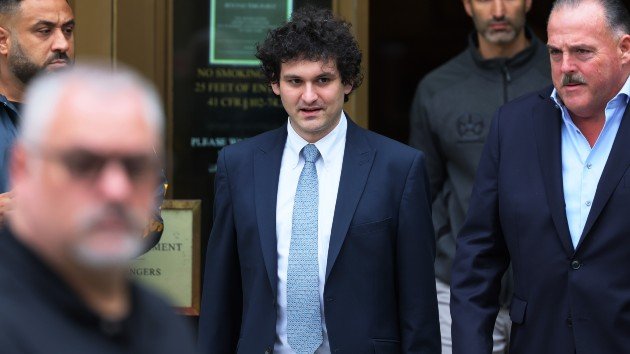WMEX Boston
Listeners:
Top listeners:
-
 play_arrow
play_arrow
WMEX WMEX Boston
-
 play_arrow
play_arrow
Courage To Hope-Episode 82-Michael Courage To Hope-Episode 82-Michael
Disgraced former FTX CEO Sam Bankman-Fried sentenced to 25 years for financial fraud
todayMarch 28, 2024

Michael M. Santiago/Getty Images
(NEW YORK) — A judge sentenced Sam Bankman-Fried to 25 years in prison Thursday for orchestrating what prosecutors have called one of the biggest financial frauds in American history.
He must also forfeit $11 billion that the government can use to compensate victims, Judge Lewis Kaplan said.
“This was a very serious crime,” Kaplan said.
Bankman-Fried, 32, stood with his hands folded in front of him, looking down, as the sentence was imposed.
Bankman-Fried was convicted last November of two counts of wire fraud conspiracy, two counts of wire fraud and one count of conspiracy to commit money laundering, each of which carried a maximum sentence of 20 years in prison. He was also convicted of conspiracy to commit commodities fraud and conspiracy to commit securities fraud, each of which carried a maximum sentence of five years in prison.
He was accused of using customer deposits on the cryptocurrency trading platform FTX, the company he founded, to cover losses at his hedge fund, pay off loans and buy lavish real estate, among other personal expenses.
Prosecutors had said he deserved between 40 and 50 years in prison because of the “enormous scale of the fraud,” though Kaplan determined that was too excessive.
The judge determined Bankman-Fried’s scheme defrauded FTX customers out of $8 billion and said the sentence was meant to “disable him” from the ability to commit another fraud for a long period of time.
“There is a risk that this man will be in a position to do something very bad in the future and it’s not a trivial risk. It’s not a trivial risk at all,” Kaplan said.
“Mr. Bankman-Fried knew, for a protracted period, that Alameda was spending large sums of FTX customer funds on risky investments, political contributions, Bahamas real estate and other things in circumstances in which FTX was seriously exposed to downside market deterioration, long calls and other risks,” Kaplan said. “He knew that FTX customer funds were not to be used for those purposes. They were not his to use.”
Bankman-Fried acknowledged some of his own failings but the judge appeared to believe his statements fell short.
“I thought one of his pithier expressions was, ‘I f—– up.’ But never a word of remorse for the commission of terrible crimes,” Kaplan said.
The judge also doubted the image Bankman-Fried cultivated with government officials.
“He presented himself as the good guy all in favor of the appropriate regulation of the crypto industry. In my judgment, that was an act,” Kaplan said.
Bankman-Fried, of Stanford, California, addressed the court before sentencing, standing at the defense table with his arms folded in front of him, looking down and often mumbling.
He conceded his “mismanagement” caused Alameda, his privately controlled hedge fund, to shut down after its initial success and said he “failed everyone and everything I care about too.”
“I threw all of that away. It haunts me every day,” he said. “I made a series of bad decisions. They weren’t selfish decisions, they weren’t selfless decisions, they were bad decisions.”
Bankman-Fried also acknowledged FTX customers have not been made whole. “The customers, creditors lenders, they haven’t been paid back,” he said. “That has caused a lot of damage.”
Sunil Kavuri, a London-based technology investor at Shomei Group, addressed the court Thursday before sentencing on behalf of 200 victims, he said.
“I suffered every day,” Kavuri said. “This is a continuous lie that we are all made whole [through bankruptcy payments].” He added that he had “money I wanted to spend on a family home taken away.”
Kavuri told the court he knows FTX victims who are suffering from depression and he said victims have taken their own lives.
More than $8 billion of customer money was misappropriated, which “puts this crime in a class of cases that can be counted on one hand,” prosecutors said. Beyond that, Bankman-Fried “victimized tens of thousands of people and companies, across several continents, over a period of multiple years. He stole money from customers who entrusted it to him; he lied to investors; he sent fabricated documents to lenders; he pumped millions of dollars in illegal donations into our political system; and he bribed foreign officials.”
Judge Lewis Kaplan immediately rejected Bankman-Fried’s claim Thursday that his fraud was not $8 billion as prosecutors alleged.
“The defendant’s argument hinges on what amounts to an assumption that customers of FTX are going to be made whole in the bankruptcy,” Kaplan said. “The defendant’s assertion that FTX customers and creditors will be paid in full is misleading; it is logically flawed.”
Bankman-Fried stepped down from his role at FTX in November 2022 amid a rapid collapse that ended with the company — once valued at $32 billion at its peak — declaring bankruptcy.
Assistant U.S. Attorney Nicholas Roos said a stiff sentence for Sam Bankman-Fried is warranted because “the defendant could commit crimes again.”
The prosecutor noted that Bankman-Fried did “not swear off doing it again” when he addressed the court.
“A sentence here of at least 40 years is necessary to make sure the defendant cannot do it again,” Roos said.
The prosecutor spoke of victims who lost everything because they trusted Bankman-Fried when he told them, via social media or some other platform, that their money was safe.
“The defendant is not a monster but he is someone who committed gravely serious crimes,” Roos said. “The criminality here is massive in scale, it was pervasive in all aspects of the business. This was not a great business that had a problem at the end. It was pervaded with fraud.”
Prior to Thursday’s sentencing, defense attorneys called the government’s ask for 40 to 50 years in prison “barbaric” and argued Bankman-Fried deserved about six years in prison because of how “deeply, deeply sorry he is for the pain he caused.” They also said the “harm to customers, lenders, and investors is zero.”
On Thursday, defense attorney Mark Mukasey insisted Bankman-Fried possesses compassion, empathy and generosity and “really, he’s an awkward math nerd.”
“He loves video games and veganism,” Mukasey told the court. “He’s compassionate to animals and children. He has a tireless work ethic. He has a completely off-the-charts, mind-blowing intellect.”
While his fraud has been compared to Bernie Madoff’s Ponzi scheme, Mukasey said the 32-year-old is no stone-cold financial assassin.
“That level of depravity is nowhere in this case. I don’t think it’s anywhere in Sam’s heart,” Mukasey said. “Sam is on the opposite end of the culpability scale.”
The lawyer added, “Sam never scurried away with billions of dollars in a Swiss bank account or under his mattress.”
Prosecutors have cast Bankman-Fried differently.
“With all the advantages conferred by a comfortable upbringing, an MIT education, a prestigious start to his career in finance, and a worthy idea for a startup business, Bankman-Fried could have pursued the rewarding, productive, and altruistic life he has sketched out in his sentencing submission. But instead, his life in recent years has been one of unmatched greed and hubris; of ambition and rationalization; and courting risk and gambling repeatedly with other people’s money,” prosecutors said.
Copyright © 2024, ABC Audio. All rights reserved.
Similar posts
CONTACTS
- https://wmexboston.com
- 781-834-WMEX(9639)
- studio@wmexboston.com
- 130 Enterprise Dr, Marshfield, MA 02171
ABOUT
WMEX Boston can be heard at 1510 AM, and 101.1 FM. Playing the greatest hits from 50s, 60s, 70s, 80s, and more!
MENU
SPONSORS
Copyright 2024 WMEX Boston - Design by Pro Radio Solutions





